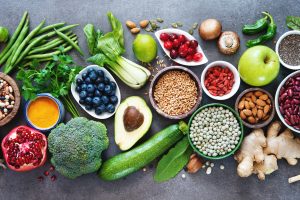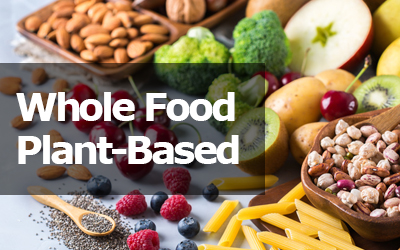What is Whole-Foods, Plant-Based Diet:
There is no wat to define what comprises a whole-foods, plant-based eating routine (WFPB diet). The WFPB diet isn’t a set eating regimen — it’s, even more, a way of life.
This is on the grounds that plant-based eating regimens can differ significantly relying upon the degree to which an individual adds animal food products for their diet. In any case, the fundamental standards of a whole-foods, plant-based eating routine are as per the following:
- Accentuates whole, very less processed foods.
- Cutoff points or maintains a strategic distance from animal products.
- Spotlights on plants, including vegetables, whole grains, legumes, fruits, seeds, and nuts, which must make up most of what you eat.
- Avoids refined nourishments, such as added sugars, processed oils, and white flour.
- Gives unique consideration to food quality, with numerous advocates of the WFPB diet advancing privately sourced, natural food at whatever point conceivable.

Consequently, this eating routine is regularly mistaken for a veggie diet or a vegan diet. However albeit comparable somehow or another, these weight control plans are not the equivalent. Individuals who follow vegan eating habits go without devouring any animal items, including dairy, meat, poultry, fish, eggs, and nectar. Vegans avoid all meat and poultry from their eating regimens, however, a few veggie lovers eat eggs, fish, or dairy.
The WFPB diet, then again, is progressively adaptable. Devotees eat generally plants, however, animal items aren’t untouchable. While one individual after a WFPB diet may abstain from eating animal items, another may eat modest quantities of eggs, poultry, fish, meat, or dairy.
How does a plant-based diet help in losing weight?

Obesity is a problem of larger extents. Over 69% of US grown-ups are overweight. The high fiber substance of the WFPB diet, alongside the prohibition of processed meals, is a triumphant blend for shedding overabundance pounds. Luckily, improvements in diet and lifestyle will promote weight loss and have a positive impact on well-being. Research has consistently demonstrated that plant-based feeding regimens are effective for weight loss.
A survey of 12 investigations that included in around 1,100 individuals found that those doled out to plant-based eating regimens lost fundamentally more weight, over 18 weeks periods, approximately 2kgs (4.5 pounds), compared to non-vegetarian eating habits. Receiving a sound plant-based eating example may likewise assist keep with weighting off over the long haul. An examination in 65 overweight and fat grown-ups found that those doled out to a WFPB diet lost essentially more weight than the benchmark group and with follow up of 1 year, encourage weight reduction of 9.25 pounds (4.2kg).
In addition, basically removing the processed items that aren’t permitted on a WFPB diet like pop, treats, fast food and refined grains is an amazing weight reduction device itself
What are the health benefits of a plant-based diet?
Receiving a whole-foods, plant-based eating routine advantages your waistline, however, it can likewise check up on interminable health problems and their side effects and reduce the danger.
1. Prevents Coronary (heart) illness

Maybe one of the most notable advantages of WFPB consumes less calories is that they are very healthy for your heart. Notwithstanding, the quality and kinds of nourishments remembered for the eating routine issue.
An enormous report in more than 200,000 individuals found that the individuals who followed a sound plant-based eating routine high in vegetables, whole grains, legumes, fruits, and nuts had a fundamentally lower danger of creating coronary illness than those following non-plant-based weight control plans. Nonetheless, unfortunate plant-based weight control plans that included sweet beverages, natural juice products, and refined grains were related to a somewhat expanded danger of coronary illness.
Devouring the correct sorts of food is basic for coronary illness prevention when trying a plant-based eating regimen, which is the reason for holding fast to a WFPB diet is the best decision.
2. Reduces Cancer risk

Research proposes that following a plant-based eating regimen may lessen your danger of particular kinds of cancer. An examination in more than 69,000 individuals found that vegetarians consume fewer calories were related to an altogether lower danger of gastrointestinal cancer, particularly for the Lacto-Ovo vegetarian diet followers.These are type of people who consume eggs and dairy.
Another huge examination in excess of 77,000 individuals showed that the individuals who followed vegetarian eating habits eat less had a 22% lower danger of creating colorectal cancer growth than non-vegetarians. Pescatarians (veggie lovers who eat fish) had the best assurance from colorectal cancer with a 43% decreased hazard contrasted with non-vegans.
3. Cognitive Decline

A few investigations recommend that slims down diets high in vegetables and fruits may aid slow or forestall intellectual decay and Alzheimer’s ailment in more established grown-ups.
Plant-based eating regimens have a higher amount of plant elements and antioxidants, which may have been appeared to slow the movement of Alzheimer’s illness and reverse subjective shortfalls.
In numerous examinations, higher admissions of foods grown from the ground have been emphatically connected with a decrease in intellectual decay. An review of nine tests involving more than 31,000 people showed that consuming more soil products contributed to a 20 percent decline in the likelihood of developing subjective deficiency or dementia.
4. Diabetes

Embracing a WFPB diet might be a compelling instrument in overseeing and decreasing your danger of creating diabetes. An analysis of nearly 200,000 people showed that those who clung to a healthy plant-based eating pattern had a 34 percent greater chance of contracting diabetes than those who adopted unsuccessful one, non-plant-based weight control plans. Another investigation showed that plant-based weight control plans (veggie lover and Lacto-ovo vegetarians) were related with almost a half decrease in the danger of type 2 diabetes contrasted with non-veggie lover consumes fewer calories. In addition, plant-based eating regimens have been appeared to improve glucose control in individuals with diabetes.
How is adopting a plant-based diet beneficial for the planet?
Changing to a plant-based eating routine, not just advantages your wellbeing — it can help ensure the conservation of nature, too. Individuals who follow plant-based weight control plans will in general have littler ecological impressions. Receiving sustainable dietary patterns can help decrease ozone harming substance (greenhouse gas) emissions, water utilization, and land utilized for plant cultivating, which are altogether elements in global warming and natural degradation.
A survey of 63 investigations demonstrated that the biggest natural advantages were seen from diets containing a minimal measure of animal-based nourishments, for example, vegetarians, vegans, and pescatarian eating patterns. The investigation revealed that a 70% decrease in ozone-depleting substance outflows and land utilization and half less water use could be accomplished by moving Western eating regimen examples to increasingly practical, plant-based dietary examples.
In addition, diminishing the number of animal items in your eating regimen and buying local, maintainable produce helps to circulate the local economy and lessens dependence on plant cultivating, an impractical technique for food manufacturing.
What type of food to eat in a whole-foods, plant-based diet?
Here is a list of food items that you can refer to when choosing what to eat during a plant-based diet.
- Whole grains- Faro, brown rice pasta, brown rice, barley, rolled oats, quinoa, etc.
- Condiments- Soy sauce, lemon juice, salsa, vinegar, nutritional yeast, mustard, etc.
- Healthy fats- olive oil, unsweetened coconut, avocados, coconut oil, etc.
- Fruits- Pears, bananas, berries, peaches, citrus fruits, pineapple, etc.
- Plant-based protein- Tempeh, plant-based powder, or proteins with no artificial ingredients or added sugar, tofu, etc.
- Seeds, nuts, and nut butters- Cashews, pumpkin seeds, almonds, natural peanut butter, sunflower seeds, tahini, macadamia nuts, etc.
- Vegetables- Broccoli, carrots, peppers, kale, asparagus, tomatoes, cauliflower, kale, etc.
- Beverages- Tea, sparkling water, coffee, etc.
- Legumes- Lentils, black beans, peas, peanuts, chickpeas, etc.
- Unsweetened plant-based milks- Cashew milk, coconut milk, almond milk, etc.
- Starchy vegetables- Butternut squash, potatoes, sweet potatoes, etc.
If you are planning to follow a plant-based diet but with animal products, then here are few items you can consume.
- Seafood- Wild-captured through sustainable fisheries (not necessary).
- Poultry- Organic, free-range if possible.
- Dairy- Organic dairy products
- Eggs- Pastured- raised (not necessary)
- Beef and pork- Grass-fed if possible
What type of food to avoid during a plant-based diet?
Consumption of food items such as eggs, seafood, dairy, beef, sheep, pork, meat, etc. should be minimized. A list is given below that must be eliminated strictly to successfully follow a plant-based diet.
- Processed vegan food- plant-based meat such as cheeses, tofurkey, vegan butters, faux, etc.
- Fast food- hot dogs, cheeseburgers, chicken nuggets, French fries, etc.
- Artificial sweeteners- Splenda, equal, sweet’n low, etc.
- Refined grains- white pasta, bagels, white rice, white bread, etc.
- Processed animal products- sausage, bacon, beef jerky, lunch meats, etc.
- Added sugars and sweets- soda, pastries, candy, juice, table sugar, sugary cereals, sweet tea, etc.
- Packed foods- frozen dinners, chips, cereal bars, crackers, etc.

